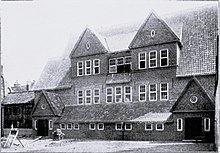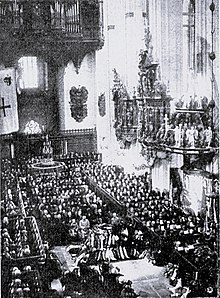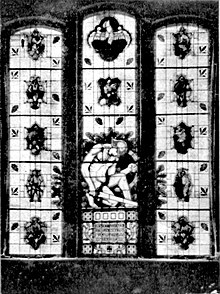Christian Reuter (pedagogue)

Hans Christian Wilhelm Reuter (born December 3, 1863 in Kiel , † January 13, 1915 between Terny-Sorny and Soissons , France ) was a German historian and educator.
Life
origin
Reuter comes from a widespread family originally based in Altona and later in Aabenraa . His father Rudolph Reuter (* 1834 in Aabenraa; † 1871 in Kiel) was a shipbuilder and owner of a shipyard in Kiel; Christian Theodor Reuter was his uncle.
career
After graduating from the Kiel School of Academics , he studied history and classical philology , especially in Kiel , where he was a member of the Krusenrotter fraternity , but also in Leipzig and Strasbourg. He spent his time as an assistant teacher ( comparable to today's legal clerkship ) at the Matthias-Claudius-Gymnasium in Wandsbek . In 1892 he also acquired the license to teach gymnastics at the Kgl. Central Gymnasium in Berlin . In the same year he was awarded a Dr. phil is doing his doctorate. After further stints at the Sundisches Gymnasium in Stralsund (1892-1899), where he also worked as a part-time city archivist from 1896 , and at the Pasewalk City School , he became director of the Royal Gymnasium in Demmin in 1901 .
The Senate put Julius Schubrings , director of the Katharineum in Lübeck , into retirement on April 1, 1904 at his request . Christian Reuter was chosen as his successor. In March 1904, the Senate awarded him the title of professor and set his inauguration on April 1. His apartment was at 34 Koenigstrasse opposite the grammar school. The young director with the Siegfried smile in place of the aging Wotan carried out a series of curriculum reforms. Drawing lessons were newly introduced, as were students' exercises in chemistry and physics. Reuter succeeded in stabilizing the grammar school, which had lost many students as a result of the temporary separation of the secondary school , the Johanneum zu Lübeck , and even allowed it to grow. Immediately after taking office, he had the traditional color-bearing student associations lifted by a resolution by the high school authorities . They were replaced by sporting associations such as the rowing team founded in the same year, a group of the Wandervogel created in 1907 and the promotion of scouting work . From 1911 onwards, Reuter carried out trips to Weimar to the festival of the German Schillerbund. The biggest structural change during his tenure was the construction of the home security style gym in 1910.
Reuter was a member of the Society for the Promotion of Charitable Activities and its director from 1913 until his war death in 1915. When the First World War broke out , the reserve captain volunteered to work at the front with his previous regiment, the Infantry Regiment "Herzog von Holstein" (Holsteinisches) No. 85, and was so badly shot at the beginning of the assault on Soissons in early 1915 wounded his neck that he died a short time later in the hospital in Chauny.
In order to honor him as one of the first and most socially respected among the Lübeck war dead, his body was transferred to Lübeck. As a widely respected speaker in the pulpit, Johannes Becker , the city's senior , gave the commemorative speech on January 20, 1915 in the overcrowded St. Mary's Church , of which he was also the main pastor . In the course of this, Becker announced, among other things, that the director had written the slogan for the window in the Katharineum, which is dedicated to the memory of the fallen : “They only died for those who live for them”. To the folk song I surrendered myself to be was coffin carried out of the church. The funeral procession then moved past "his" Katharineum to the general church . The flags of the city blew at half-mast and all the bells of the city ringing . The honor company of the local regiment walked at the head, delegations from the Senate , the citizenship and countless corporations , associations and schools followed the coffin past thousands of citizens of the city. According to a contemporary report, it was a memorial service the likes of which the city had not experienced since Geibel's time .
Although Reuter's importance for Lübeck would have suggested it, he was not given a grave of honor , so that the graves of father and son were leveled a long time ago.
family
Reuter's son, who had interrupted his law degree to volunteer with his father, fell a short time later.
- Funeral procession on the way to the burial in front of the Katharineum
Fonts
- The oldest rent book in Kiel (1300–1487). 1892/1993.
- The second Stralsund city book (1310–1342). 1896.
- The Kiel Heritage Book (1511–1604). Edited and edited by Christian Reuter on behalf of the Society for Kiel City History. Eckardt, Kiel 1897.
literature
- The directors Breier, Schubring and Reuter. Reprinted from the school programs 1881, 1915, 1916 and the Vaterstädtischen Blätter 1915, no. 7. In: Festschrift for the four hundredth anniversary of the Katharineum in Lübeck 1531–1931. Lübeck 1931, pp. 52–64 (photo Reuters on p. 61).
- Richard Carstensen : (Hans) Christian (Wilhelm) Reuter. In: Schleswig-Holstein biographical lexicon . Volume 3. 1974, pp. 222-223.
- Johannes Kretzschmar: Christian Reuter. In: ZLG. 17, 1915, pp. 1–5 (with list of publications).
- Rolf Saltzwedel: On the 50th anniversary of Christian Reuter's death. In: Lübeckische Blätter . 125, 1965, pp. 27f.
- Johannes Warncke: Prof. Dr. Christian Reuter. In: The home. 26, 1916, pp. 13-14 (with portrait).
- Oskar Beltz: The Duke of Holstein Infantry Regiment (Holst.) No. 85 in the World War ; 1921 Heide, printing: Heider Anzeiger , GmbH, Heide i. Holst., 190 pages
Web links
- Christian Reuter's personnel sheet in the BIL's personal file in the archive database of the Library for Research on Educational History (BBF)
Individual evidence
- ↑ Local and mixed notes. , in Lübeckische Blätter ; Volume 45, number 40, edition of October 4, 1903, p. 515.
- ↑ Local and mixed notes. , in Lübeckische Blätter ; Volume 45, number 52, edition of November 27, 1903, p. 726.
- ↑ Local and mixed notes. , in Lübeckische Blätter ; Volume 46, number 10, edition of March 6, 1904, p. 154.
- ↑ The Directors ... (lit.), p. 60.
- ↑ On January 13, 1906, Reuter founded the association of former 85s for Lübeck and the surrounding area , of which he was chairman until the end.
- ^ Ritter, Holger: History of the Schleswig-Holstein Infantry Regiment No. 163 ; Leuchtfeuer Verlag, Hamburg 1926, pp. 57-60, volume 184 of the preuss. Share of the reminder sheets
- ^ For example, in a letter from the hospital nurse Magdalene Reimann to her parents on January 19, 1915; Copy of letters in private ownership.
- ↑ Reuter was not yet on the only recently landscaped memorial cemetery buried .
- ↑ Quotation from Carstensen (Lit.) p. 223; See also
- ↑ Funeral of Director Professor Dr. Reuter. In: Vaterstädtische Blätter, year 1915, No. 19, edition of February 2, 1915.
| predecessor | Office | successor |
|---|---|---|
| Julius Schubring |
Director of the Katharineum in Lübeck 1904–1915 |
Georg Rosenthal |
| personal data | |
|---|---|
| SURNAME | Reuter, Christian |
| ALTERNATIVE NAMES | Reuter, Hans Christian Wilhelm (full name) |
| BRIEF DESCRIPTION | German historian and educator |
| DATE OF BIRTH | December 3, 1863 |
| PLACE OF BIRTH | Kiel |
| DATE OF DEATH | January 13, 1915 |




